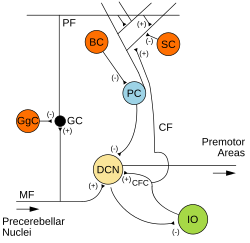| Golgi cell | |
|---|---|
 Microcircuitry of the cerebellum. Excitatory synapses are denoted by (+) and inhibitory synapses by (-). MF: Mossy fiber. DCN: Deep cerebellar nuclei. IO: Inferior olive. CF: Climbing fiber. GC: Granule cell. PF: Parallel fiber. PC: Purkinje cell. GgC: Golgi cell. SC: Stellate cell. BC: Basket cell. | |
| Details | |
| Location | Granular layer of the cerebellum |
| Identifiers | |
| NeuroLex ID | nifext_129 |
| Anatomical terms of neuroanatomy | |
In neuroscience, Golgi cells are the most abundant inhibitory interneurons found within the granular layer of the cerebellum.[1] Golgi cells can be found in the granular layer at various layers.[2] The Golgi cell is essential for controlling the activity of the granular layer.[3] They were first identified as inhibitory in 1964.[4] It was also the first example of an inhibitory feedback network in which the inhibitory interneuron was identified anatomically. Golgi cells produce a wide lateral inhibition that reaches beyond the afferent synaptic field and inhibit granule cells via feedforward and feedback inhibitory loops.[4] These cells synapse onto the dendrite of granule cells and unipolar brush cells. They receive excitatory input from mossy fibres, also synapsing on granule cells, and parallel fibers, which are long granule cell axons. Thereby this circuitry allows for feed-forward and feed-back inhibition of granule cells.
- ^ Cite error: The named reference
Brickley_1996was invoked but never defined (see the help page). - ^ Cite error: The named reference
Tia_1996was invoked but never defined (see the help page). - ^ Cite error: The named reference
Jakab_1988was invoked but never defined (see the help page). - ^ a b Eccles J, Llinas R, Sasaki K (December 1964). "Golgi cell inhibition in the cerebellar cortex". Nature. 204 (4965): 1265–1266. Bibcode:1964Natur.204.1265E. doi:10.1038/2041265a0. PMID 14254404. S2CID 4187138.